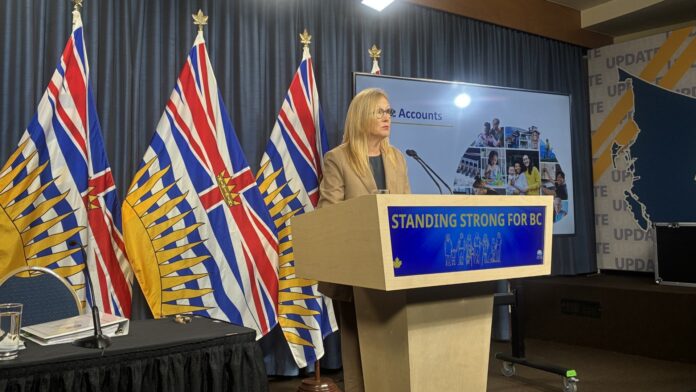British Columbia reported a smaller deficit than expected for the 2024-25 year, at $7.3 billion.
The latest third quarter update had predicted a deficit of about $9.1 billion.
Finance Minister Brenda Bailey said Thursday the deficit was brought down by higher revenues, including from the Insurance Corporation of British Columbia, even as natural resource revenue fell.
The deficit at the end of the previous fiscal year, 2023-24, was just over $5 billion.
The ministry said the growing deficit comes as the province supported people through wildfires, high interest rates, and inflation.
“We will continue to make the tough decisions necessary to make sure every dollar we spend has the greatest impact in the lives of British Columbians,” Bailey said in a statement.
Total revenue was $84.1 billion, about $2.5 billion higher than anticipated in the initial 2024-25 budget.
Taxpayer-supported debt increased by $23.7 billion, to $99.1-billion, while the provincial GDP grew by 1.2 per cent.
The ratio of taxpayer-supported debt relative to gross domestic product is an indicator of the province’s ability to manage its debt load.
B.C.’s current debt-to-GDP ratio is 23.2 per cent, which Bailey noted is low compared to other provinces. Only Alberta had a lower ratio at 22.1 per cent in 2024.
The ministry reported $10.4 billion in taxpayer-supported spending on infrastructure like schools, hospitals, housing, roads, transit and other capital projects.
Total provincial debt reached $133.9 billion, up 24.5 per cent.
Conservative finance critic Peter Milobar said that’s a 47 per cent increase since Premier David Eby took office in 2022.
“Eby’s debt disaster will only continue to spiral out of control, with major costs on the horizon, including wildfire contingencies, public sector bargaining and contract increases, and rising infrastructure cost pressures from the added cost of the CBA model,” said Milobar in a statement.
The unemployment rate was 5.6 per cent in 2024, up from 5.2 per cent the previous year.
The province’s first quarter update for the 2025-26 budget is set to be released September 15.






